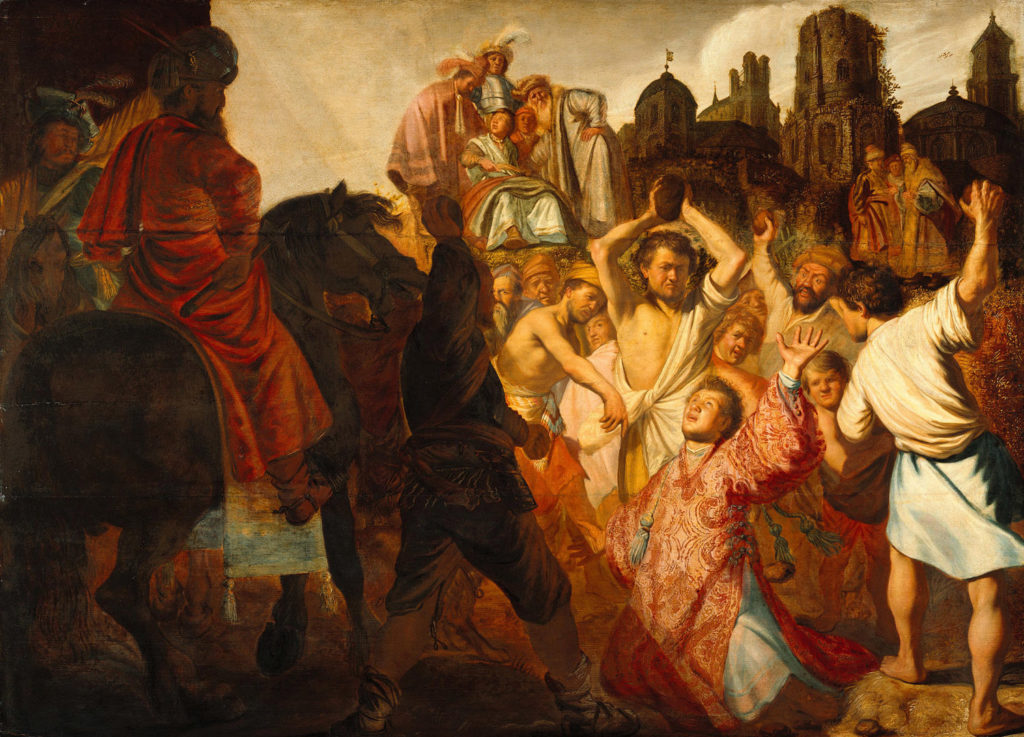[Greek] ὁρμάω (hormaō), [Latin] introire: to set into motion, to hasten, to rush, to start, to spur, to urge on, to run violently, to rush in a stampede, to incite; Mt. 8:32, Mk.5:13, Lk.8:33, Acts.7:57, Acts.19:29

The Stoning of Stephen (painting by Rembrandt in 1625): The Jews were “moved” to stone Stephen to death. Experts claim that the person immediately behind Stephen (with the stone) may be the image of Rembrandt.
Background Information:
Greek Hellenism: This term, conveying rapid or swift movement, can be found in physical, and varying “movements” of psychological (emotional) senses. The physical sense is illustrated by military movements and motion in the cosmos. Xenophon’s Anabasis 4.3.31 states, “While they were equipped well enough for attack and retreat in the mountains, their equipment was not adequate for hand to hand fighting.” The emotional sense is illustrated by emotions of anger (temper), passions, impulses, desires, and inclinations. These psychological senses, depending on the circumstances, may or may not be subject to the will. Xenophon’s Anabasis 3.1.24 states, “Let us not, in the name of the gods, wait for others to come to us and summon us to the noblest of deeds.” Interestingly, this psychological sense of this term is unique to Hellenism.
Old Testament: This term is related to several Hebrew words indicating various motions and impulses. Interestingly, there is no Hebrew term for will. The Hellenistic psychological sense is hardly used at all in the Old Testament. The Hebrew meanings refer to hurrying, to being eager, to turning, to approaching, to deploying, to plundering, to retreating, to putting upon, to setting in place, and to bringing to pass. Hostile and violent movement occur in the Maccabees books. Sexual desires and passions are “moved” in Genesis and in Song of Solomon. Man is often seen moved by the Spirit. God’s wrath is also often evoked towards man. The sense of movement helps to illustrate the Old Testament’s concept of Yahweh as a wrathful God.
The waters of the Jordan resumed their course (Jos.4:18). He stirred up the east wind in the heavens (Psa.77:26). The Jews determined not to delay, but to charge gallantly (2Macc.15:17). Yet your urge shall be for your husband (Gen.3:16). Your rage against the sea (Hab.3:8). The Spirit of the Lord will rush upon you (1Sam.10:6). The Spirit which had lifted me up seized me (Eze.3:14). Everyone keeps running his course, like a steed dashing into battle (Jer.8:6).
New Testament: Interestingly, this term is narrowly defined by rushing as in a stampede. As in the Old Testament, this term does not have a psychological sense. Both man and swine rush forward in violent movement devoid of any reason. As the demons enter the swine, the swine rush down into steep bank and later drown. Men rush forward to kill Stephen and also seize Paul’s traveling companions. This violent movement stands in contrast to the Hellenistic notion of a thoughtful and deliberate action of a person.
Scripture:
“The demons came out of the man and entered the swine, and the herd rushed down the steep bank in the lake and was drowned.” Lk. 8:33
Jesus’ speaking of the name of the demons prompts them to leave the man and enter into the swine. The swine are forced into the lake.
“The city was filled with confusion, and the people rushed with one accord into the theater, seizing Gaius and Aristarchus, Paul’s traveling companions.” Acts 19:29
The silversmiths rioted in response to Paul’s words saying that the gods made by hands are not gods at all. In their anger, they seize Paul’s companions.
“But they cried out in a loud voice, covered their ears, and rushed upon Stephen together.” Acts 7:57
When the crowd heard Stephen’s words, they reacted in fury. The people intended to stone Stephen. Stephen becomes the first Christian martyr.
Conclusion:
Hormone, hormonal, intro, introduction
It was interesting to learn that the psychological sense of this term is strictly a Hellenistic convention. Yet, this rarely occurs in the Old Testament or New Testament. I can only imagine that this psychological sense would occur quite frequently in the popular Greek tragedy (play).
The Old Testament is already known for such great “movements” of rebellion, disobedience, violence, and wrath, passion, feelings and emotions. Even Jesus, who held power over the demons, could evoke fear among them. The demons forced the swine to drown in the lake. Paul’s words about the false nature of the gods provoked the fury among the silversmiths. Essentially, the words of Stephen and Paul eventually provoked the Jews to put them to death.
Rembrandt made many self-portraits of himself over his life. He even placed his self-portrait (as a participant or spectator) in at least five of his paintings. In his painting, ‘The Stoning of Stephen,’ painted in 1625, experts claim that the person (holding the rock) immediately over Stephen is the image of Rembrandt himself. Rembrandt’s identification with saint’s executioners helps explains why he later appeared in he later appeared in his later painting ‘The Raising of the Cross.’
Hormones such as adrenaline (and others) act on our bodies to stimulate or “incite” various body processes. No wonder it is called ‘adrenaline rush’!
Got to go. I need to rush off to work on my next post.
